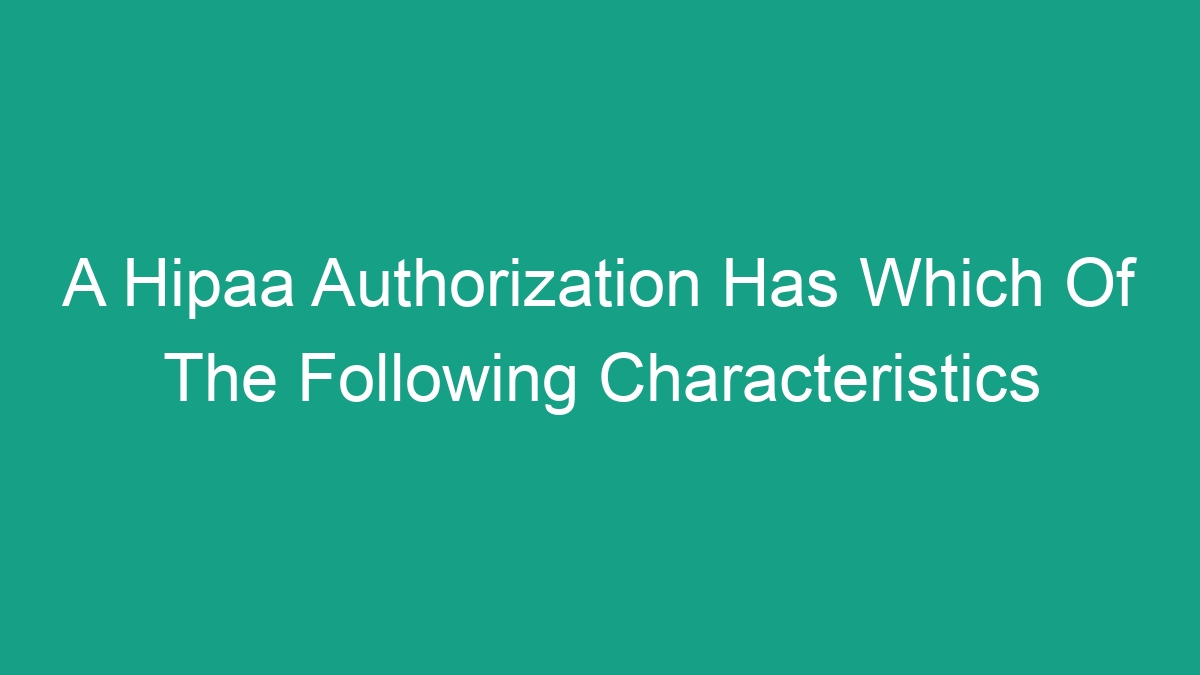
In the world of healthcare, protecting the privacy and security of patient information is crucial. This is where the Health Insurance Portability and Accountability Act (HIPAA) comes into play. HIPAA is a federal law that sets standards for the protection of individuals’ sensitive health information and the privacy of their personal health data. In this article, we will explore the characteristics of a HIPAA authorization and its importance in safeguarding patient privacy.
What is a HIPAA Authorization?
A HIPAA authorization is a document that allows a covered entity, such as a healthcare provider or health insurance company, to use or disclose an individual’s protected health information (PHI) for a specific purpose. The authorization must be in writing and must comply with the requirements set forth in the HIPAA Privacy Rule.
Characteristics of a HIPAA Authorization:
1. Specificity
One of the key characteristics of a HIPAA authorization is specificity. The authorization must clearly state the purpose for which the protected health information will be used or disclosed. This means that the individual must be informed of who will be using or disclosing their information, what information will be disclosed, and for what purpose.
For example, if a patient is authorizing the release of their medical records to a specific specialist for a second opinion, the authorization should clearly state the name of the specialist and the reason for the disclosure.
2. Expiration Date
A HIPAA authorization must include an expiration date or an expiration event. This ensures that the individual’s consent to use or disclose their protected health information is time-limited. Once the expiration date or event has passed, the authorization is no longer valid, and the covered entity is no longer authorized to use or disclose the individual’s PHI for the specified purpose.
3. Revocability
Another important characteristic of a HIPAA authorization is the individual’s right to revoke the authorization at any time. The individual must be informed of their right to revoke the authorization in writing and must be provided with instructions on how to do so. Once the authorization is revoked, the covered entity is no longer authorized to use or disclose the individual’s protected health information for the specified purpose.
4. Acknowledgment of Rights
A HIPAA authorization must include a statement that informs the individual of their rights regarding the use and disclosure of their protected health information. This includes the right to receive a copy of the authorization, the right to request restrictions on the use or disclosure of their information, and the right to refuse to sign the authorization.
5. Identifying Information
The authorization must include the individual’s specific identifying information, such as their name, date of birth, and a description of the information to be used or disclosed. This helps to ensure that the authorization pertains to the correct individual and that the covered entity is using or disclosing the correct information.
6. Clear and Concise Language
A HIPAA authorization must be written in clear and concise language that is understandable to the individual. It should clearly explain the purpose of the authorization, the rights of the individual, and the consequences of signing the authorization. This ensures that the individual is fully informed and understands the implications of giving their consent.
The Importance of a HIPAA Authorization
A HIPAA authorization is a critical component of protecting patient privacy and securing their sensitive health information. Without a valid authorization, covered entities are prohibited from using or disclosing an individual’s protected health information for any purpose other than treatment, payment, or healthcare operations.
By ensuring that a HIPAA authorization contains the characteristics mentioned above, individuals can have confidence that their privacy rights are being respected and that their information is being used or disclosed in a manner that is consistent with their wishes.
It is important for covered entities to adhere to the requirements of the HIPAA Privacy Rule and obtain valid authorizations before using or disclosing an individual’s protected health information. Failure to do so can result in severe consequences, including civil penalties and enforcement actions by the Department of Health and Human Services Office for Civil Rights.
In conclusion, a HIPAA authorization has several key characteristics that are designed to protect the privacy and security of individuals’ protected health information. By ensuring that authorizations are specific, time-limited, revocable, and contain acknowledgment of rights, identifying information, and clear language, covered entities can uphold the principles of patient privacy and safeguard sensitive health information. It is crucial for healthcare providers, health insurance companies, and other covered entities to understand the requirements of a HIPAA authorization and to obtain valid authorizations before using or disclosing protected health information.



